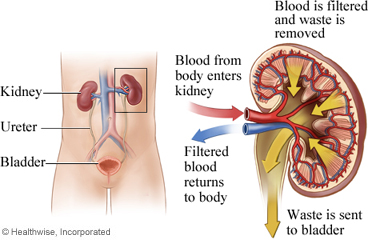
What is chronic kidney disease?
Chronic kidney disease means your kidneys have not worked right for a while. It most often happens as a result of damage to your kidneys over many years. But it can also happen quickly.
Your kidneys have an important job. They remove waste and extra fluid from your blood. This waste and fluid goes out of your body in your urine.
When your kidneys don't work as they should, wastes build up in your blood. This makes you sick.
Chronic kidney disease is also called chronic renal failure. Or it may be called chronic renal insufficiency.
How is chronic kidney disease diagnosed?
Your doctor will ask you about past kidney problems. You will be asked if you have a family history of kidney disease. Your doctor will also want to know what medicines you take. This includes prescription and over-the-counter medicines.
Your doctor will do blood and urine tests to check how well your kidneys are working. This will help your doctor see how well your kidneys filter your blood.
You may have a test, such as an ultrasound or CT scan. These tests let your doctor look at a picture of your kidneys. This can help your doctor measure the size of your kidneys and see if anything is blocking your urine flow.
In some cases, your doctor may take a tiny sample of kidney tissue. This is called a biopsy. It helps the doctor find out what caused the kidney disease.
What are the symptoms?
Many people with chronic kidney disease don't have symptoms. If your kidneys get worse and start to fail, you may:
- Have swelling and weight gain. This is from the extra fluid in your tissues. It is called edema (say "ih-DEE-muh").
- Often feel sick to your stomach (nauseated) or vomit.
- Have trouble sleeping.
- Urinate less than normal.
- Have trouble thinking clearly.
- Feel very tired.
What happens when you have chronic kidney disease?
In the early stages of the disease, your kidneys are still able to regulate the fluids, salts, and waste products in your body. But if you keep losing kidney function, you may start to have problems, or complications.
How long it takes for the kidney disease to get worse depends on your condition. Sometimes it gets worse very slowly over many years. Or it may get worse more quickly.
When kidney function falls below a certain point, it is called kidney failure. Kidney failure affects your whole body. It can cause serious heart, bone, and brain problems and make you feel very ill. Untreated kidney failure can cause death.
How is it treated?
Manage your health problems
- If you have diabetes, it's important to keep your blood sugar level in your target range with diet, exercise, and medicines. If your blood sugar level is too high for too long, it can damage your kidneys.
- If you have high blood pressure, it's important to control it with diet, exercise, and any medicines your doctor prescribes.
Treat problems caused by kidney disease
- If your doctor put you on a special diet, stay on the diet.
- If you have kidney failure, you'll probably have two treatment choices. Your doctor may recommend that you start kidney dialysis to filter wastes and extra fluid from your blood. Or it may be better to get a new kidney (transplant). Both treatments have risks and benefits. Talk with your doctor to decide which is best for you.
Practice healthy habits
- Be active. Walking is a good choice. Try for at least 30 minutes on most days of the week.
- Follow a diet that is healthy for your kidneys. A dietitian can help make an eating plan with the right amount of salt (sodium), protein, and fluids.
- Don't smoke. Smoking can make chronic kidney disease worse. If you need help quitting, talk to your doctor about stop-smoking programs and medicines.
- Avoid medicines that can harm your kidneys. These medicines include nonsteroidal anti-inflammatory drugs. Examples of these are ibuprofen and celecoxib. Let your doctor know all of the prescription and over-the-counter medicines, vitamins, and herbs you take. And talk to your doctor before you take anything new.
- Limit your use of alcohol, and avoid illegal drugs.
Get follow-up care
Go to all follow-up visits. Your doctor will use blood and urine tests to regularly check how well your kidneys are working and decide if you need changes in your treatment plan.
Follow-up care is a key part of your treatment and safety. Be sure to make and go to all appointments, and call your doctor if you are having problems. It's also a good idea to know your test results and keep a list of the medicines you take.
Where can you learn more?
Go to http://www.healthwise.net/patientEd
Enter V124 in the search box to learn more about "Learning About Chronic Kidney Disease".
Current as of: October 11, 2024
Author: Ignite Healthwise, LLC Staff
Clinical Review Board
All Ignite Healthwise, LLC education is reviewed by a team that includes physicians, nurses, advanced practitioners, registered dieticians, and other healthcare professionals.

